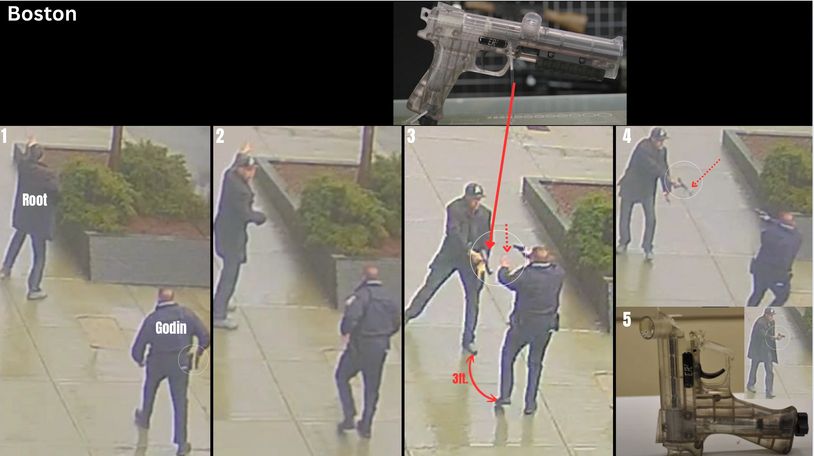JUSTON ROOT’S STORY: A DEMAND FOR JUSTICE

On February 7, 2020, Juston Root was just steps from his longtime mental health clinic, located next to the Brigham and Women's Hospital (BWH) campus—where he had received treatment for nearly a decade—when a hospital security guard, after briefly speaking with him and shaking his hand, falsely reported that Juston had threatened to shoot him. The security guard later recounted observing something clear in Juston's waist that he thought could be a gun. In reality, it was an oversized, clear plastic paintball marker, with a chimney-like piece protruding above the waistline—off to the side and mostly concealed by his long dark coat.
Juston had committed no crime and had walked away peacefully. As they waited for Boston Police to arrive in response to what they claimed was a “dangerous gunman,” the unarmed BWH security guards began agitating and escalating the situation, rather than diffusing it. Meanwhile, a security officer from the nearby mental health facility—standing approximately 60 feet away—recognized that what Juston had was clearly a toy.

When Boston Police arrived, they opened fire within minutes, discharging 15 rounds. As the first officer approached, Juston—struggling to communicate due to his psychiatric disability—repeatedly shouted that he was with law enforcement, a known symptom of his mental health condition. With his firearm already drawn and without any attempt at de-escalation, the officer closed the distance while Juston’s back was turned, advancing to within 36 inches. When Juston turned and saw the gun pointed at him, he pulled out an oversized, clear plastic paintball marker from his waistband. The officer immediately fired, shattering it and leaving only the clear handle in Juston’s hand. Together, the two responding officers fired 15 rounds. One bullet ricocheted a significant distance and struck a hospital valet in the head.
Despite being seriously wounded and bleeding, Juston managed to get into his car and drive slowly away. Four Boston Police cruisers followed him at a low speed, yet none ran his license plate—a routine check that could have identified him and provided crucial information. Instead, without provocation, an officer performed a high-risk PIT maneuver typically reserved for high-speed pursuits. Terrified and bleeding, Juston panicked and fled, fearing for his life.

Seven minutes after being shot multiple times, Juston crashed his vehicle and staggered out—having lost nearly 2,000cc of blood—before collapsing in a mulch bed near a supermarket parking lot. He was unarmed, barely conscious, and clearly in urgent need of medical care.
A civilian EMT rushed to his side to provide aid, but officers quickly approached with guns drawn and ordered her to leave. Fearing for her safety, she reluctantly left his side. Seconds later, one officer kicked Juston before the officers formed a semicircle around him and fired 31 bullets at point-blank range—despite him lying on the ground, covered in blood, clearly incapacitated, and unarmed. He posed no threat. He never stood a chance.

Only one body-worn camera was recording, but its lens became obstructed—likely by the officer's arm—and the footage goes dark just before and during the shooting.
Just 30 days later, the Norfolk County District Attorney’s office cleared the six officers involved. However, critical evidence—including the EMT’s testimony about Juston’s condition before he was killed—was excluded from the final report. Many officers met as a group before giving their witness statements, which were recorded five days after the shooting. The Norfolk County District Attorney’s report is inadequate, incomplete, and lacks transparency.
For over five years, the Root family has demanded a thorough, independent investigation—free from the bias and influence that have tainted the process. We call for a timely, transparent, and impartial investigation into Juston’s death.

Juston Root
1/3

We need your help
We demand the reopening of Juston Root’s case and a full independent investigation. No justice without truth! #TruthMatter #Juston #JustOne
